
Owning paella pans from Machika.com is great for cooking meals with the entire family and trying out traditional paella recipes from Spain. However, not everything is fun and easy. Taking care of your paella pan is just as important as knowing how to use it! By ensuring you take proper care of your paella pans they will last a long time without heavy rusting or damage. Depending on which type you buy (enameled or polished steel paella pans), there will be different ways to take care of them.
You should not treat your paella pans as any other pan. After all, the better you care for your kitchenware the longer it can serve you! Even as your pans age, they can still work perfectly fine. However, if you do not take care of them, then you could end up damaging the metal. For example, using hard scrub brushes can damage the surface of your pan. This can lead to premature rusting that can spread throughout the surface.
How to prevent paella pan rusting at home
The best way to keep your paella pan from rusting is to be proactive. Rather than just thinking of treating it when the problem arises, it is easier to ensure it never rusts in the first place! So, what are the best steps towards ensuring your authentic Machika paella pan works as well as the day you bought it every time? Well, the first things to keep in mind are what NOT to do when taking care of a paella pan. Some of the most common things to avoid include:
- Leaving an empty pan to heat up
- Washing with abrasive materials like steel wool
- Leaving food in the pan overnight or in the fridge
- Placing your paella pan in the dishwasher
- Using metal utensil roughly in the pan
- Not drying the pan properly after cleaning
Leaving an Empty Pan to Heat Up
Something that is not only a danger to your pan, but your kitchen is overheating. Overheating occurs when a metal pan grows too hot without a substance in the pan to transfer the heat. The metal can become permanently burnt. In a worst-case scenario, the pan may even catch on fire. This is not unique to paella pans, and most steel pans should never be left on a stove with no oil or food to cook. Eventually, the heat can even melt the pan. Rather than risking any burning or damage to your paella pans, you can instead ensure you have some oil within the pan while pre-heating. Burned pans will blackened and deteriorate. You may notice metal starts flaking. In this case, you are better off purchasing a new paella pan.
Washing with Abrasive Materials like Steel Wool
When cleaning your pan, one thing you want to avoid the most are abrasive scrubbing pads. Non-scratch pads are fine, but more serious ones, like steel wool scrubbers, may be too rough. When cleaning your paella pan, avoid damaging it by scrubbing too hard. Steel wool can dig past the top layer of metal and into metal. Water may eventually degrade the pan by seeping into the scratches leading to rust. Treat the surface of your pan carefully to avoid damaging it. For example, if you have stuck on food and grime, do not brute force it off with a coarse pad. Instead, let the pan soak for an hour or overnight in some warm water and soap. The grime should come off without much of an issue.
Leaving the Pan with Food Overnight or In the Fridge

A bad practice when it comes to caring for your pans is forgetting to clean it. Leaving food in the pan overnight can lead to more staining and damage the top layer. More acidic foods like seafood or salty recipes are more likely to damage your pan if left in the pan overnight. The last thing you want to do is store your food for long periods of time in a paella pan.
While they can be great for carrying your food and leftovers, you should remove the food from the pan and into a container when storing food. This way, you avoid having the metal corrode because of long exposure to acidic compounds and moisture. Just remember to clean your paella pan as soon as possible. While storing it for an afternoon with foil as your serve, it will not cause any issues, leaving it in the pan for the night may damage the pan.
Placing a Paella Pan in the Dishwasher
For most materials, the dishwasher is often now the best piece of tech to use. While it can be convenient, there is a reason every container or pan is not listed as dishwasher safe. Dishwashers spray hot jets of water and soap around the area. The pressure of these jets of water can damage the surface of your pan. There is also the issue of how dishwashers dry. Typically, a heating element evaporates the water. However, this means inside the dishwasher it is extremely humid. If you leave the dishwasher running overnight, you may end up with a damaged paella pan in the morning.
If you want to keep your paella pan in top shape, the key thing to avoid is damage to the surface. Anything that you cannot use on more sensitive cookware or kitchenware probably will not be safe to use on paella pans. Rather than risking damaging your pan for a quick clean, only wash by hands and avoid corrosive compounds or abrasives like steel wool brushes.
Scratching with Metal Utensils
A straightforward way to damage many pans, not just paella pans, is to use metal utensils. While you can be careful and reduce the chance of scratching, most people would rather not change how they cook. Cooking paella requires a lot of mixing and scratching of the bottom of the pan to get all the flavors mixed. During this, it's easy to scratch the bottom leading to damage.
For enameled paella pans, it is even more important to use scratch proof utensils when cooking. Nowadays, bamboo or food safe plastic utensils are available alongside metal utensils. If you want your paella pan to last a long time without pealing the enameled coating, then bamboo is the perfect material. The wood is too soft to scratch and easy to clean alongside your Machika paella pan.
Leaving the Paella Pan to Drip Dry
Leaving your pan to drip dry in most cases won’t cause any immediate damage. However, over time pan can show signs of deterioration. The clearest sign is rust build up. If you are seeing spots of rust after you’ve cleaned your paella pan, then water may have found its way into the pan. A great way to avoid water causing rust is to keep your pan as dry as possible. Rather than letting it drip dry on a rack, take a soft cloth or some paper towels and wipe it dry. That way, water has less time to penetrate the metal. Man pans, such as cast-iron pans, also require quick drying to avoid rust. While a paella pan is a lot more rust resistant compared to cast iron, it can still rust due to a lack of care.
How Care for your Paella Pan

So now that you what not to do, here is how you do take care of your paella pan and stop rusting. The first step to taking care of your pan is to always hand wash it with a soft sponge or non-scratching scrub pad. Avoid doing anything that would cut into the metal, such as trying to cut ingredients while already in the pan. You will also want to avoid moisture. Even if you dry the pan, it can still deteriorate is stored in an area with high moisture. A great way to avoid moisture damage is to dry and store your paella pan in a plastic bag or with a cloth over the pan. That way, there is less moisture present and you have a lower chance of rusting.
Another great technique is to season your pan. Seasoning is exactly like treating a cast iron pan, but a little simpler. Rather than having to heat the pan in an oven to build a non-stick layer, you simply need the oil to stop oxidation and rusting. Take a paper towel and drop a small amount of oil in the pan. Wipe the oil around the inside and outside of the pan. Wipe off any excess oil so that there is only a thin layer cover the pan. Then place the pan in a plastic bag, wax paper, or plastic wrap. You could even place your pan in a paper bag. The oil will help protect the pan, help prevent food from sticking, and keep your paella pan in tip-top shape without any rust. As for which oil you should use, any type of cooking oil should work. Extra virgin olive oil is a great choice since most paella recipes call for its use anyway. Other oils may contain aromas and taste that you do not prefer in your food, so use a cooking oil you enjoy.
Remove Rust from a Paella Pan
But how to you remove rust from a paella pan? After all, it’s great to know how to prevent it, but what if it has already occurred? It will depend on how extensive the damage is. If the rust has dug deeper into the metal than just the surface, you may be better off buying a new paella pan. However, if it is just surface level, then you can most likely fix the issue. The only things you need to remove rust from a paella pan are:
- White vinegar
- Scrub pad (careful using steel wool, do not scratch too hard)
- Warm water
- Cloth for drying
The process is quite simple and the same for most steel kitchenware and cookware. Fill the pan with vinegar until it covers the rust spots. Then let the vinegar sit over the rusted spots for around 15 minutes. The worse the rusting, the longer you may have to soak in vinegar. Light rusting may only need 5 minutes of soaking. After soaking, scrub the rusted spots lightly with a scrub pad. If using a steel wool scrubber, softly scrub the rust away to avoid damaging the pan. Afterwards, simply rinse with warm water and dry with a cloth or paper towels. From there, you will want to treat your pan right by applying some oil to the surface to avoid further oxidation and rusting. Store in a cool, dry place.
Buy Paella Pans and More at Machika.com!
Now that you know how to avoid rusting your paella pan and how to treat it if it rusts, you are ready to become a paella master. Buy one of our Machika.com polished steel paella pans today to get an authentic Spanish paella pan at an affordable price. At Machika, #EveryoneIsInvited
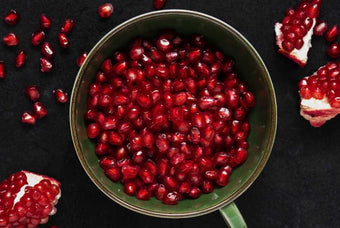
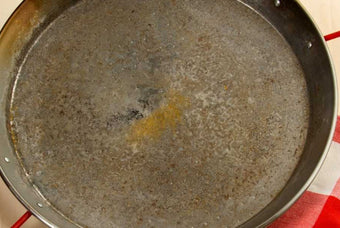
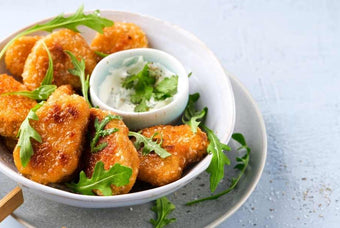
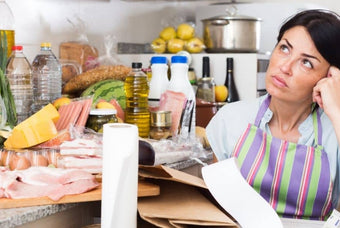
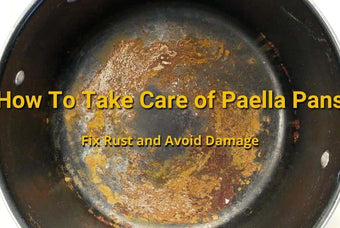
0 comments. Write a comment